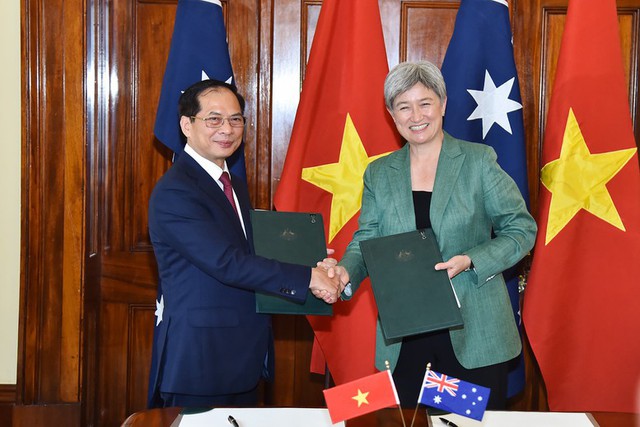Viet Nam, Australia sign new action program for implementation of comprehensive strategic partnership
VGP – Viet Nam and Australia have signed a new action program to implement the comprehensive strategic partnership in the period 2024-2027.

Vietnamese Deputy Prime Minister and Foreign Minister Bui Thanh Son (left) and Australian Foreign Minister Penny Wong sign an action program to implement the Viet Nam-Australia comprehensive strategic partnership for 2024-2027 in Adelaide city, October 18, 2024.
The document was signed by Vietnamese Deputy Prime Minister and Foreign Minister Bui Thanh Son and Australian Foreign Minister Penny Wong, within the framework of the 6th Viet Nam - Australia Foreign Ministerial Meeting, in Adelaide city on October 18.
At the meeting both sides expressed their pleasure at the fine development of the Viet Nam-Australia relations across fields, both at bilateral and multilateral aspects.
The two sides agreed that the elevation of the bilateral ties to a comprehensive strategic partnership on the occasion of Prime Minister Pham Minh Chinh's official visit to Australia last March is of historic significance as it opens up a new cooperation stage for the two countries, featuring with higher political trust, broader, deeper and more practical cooperation.
Both sides pledged to work together to raise the two-way trade to US$20 billion and to double the two-way investment as mutually agreed in the Australia-Viet Nam Enhanced Economic Engagement Strategy (EEES).
Bui welcomed Australia's efforts to speed up the implementation of its Southeast Asia Economic Strategy to 2040 in Viet Nam while Wong affirmed Viet Nam is one of Australia's most important regional partners.
Regarding cooperation between the two foreign ministries, both sides agreed to promote the role of the existing cooperation mechanisms, enhance the exchange of strategic information including through channels 1.5 and 2 .
Both sides also agreed to further strengthen coordination and mutual support at multilateral forums, especially the United Nations and ASEAN.
Wong affirmed Australia attaches importance to cooperation with ASEAN as well as ASEAN centrality, pledging to boost cooperation for sustainable development in the Mekong subregion through the Mekong-Australia Partnership framework.
On the East Sea issue, both sides underscored the importance of maintaining peace, stability, safety and freedom of navigation and aviation in the East Sea, and respecting international law, including the 1982 United Nations Convention on the Law of the Sea./.

